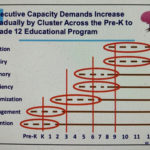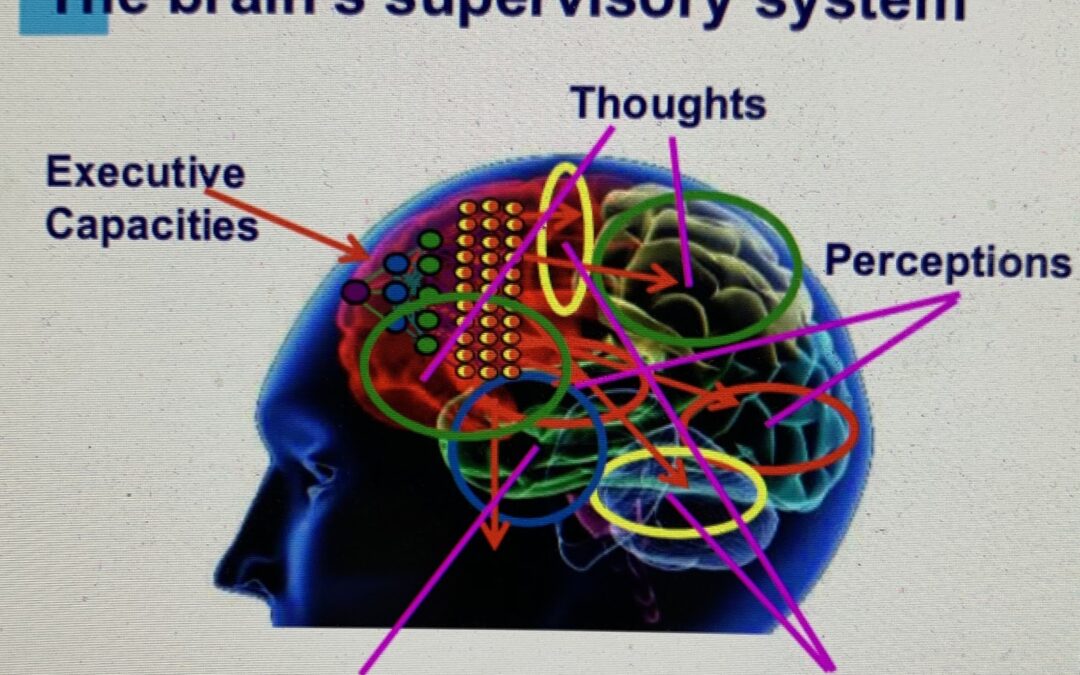You might read this post’s title and think, “Executive brain skills? What are you talking about?” Helping your child grow their executive brain skills and capacities can be a valuable new awareness which, I believe, parents can easily adopt. I see in my work with parents that they willingly give away the responsibility of a child’s brain development solely to the educational setting to develop these skills along with teaching the curriculum. Those who do this are putting their child at a very large disadvantage. I see both parents who are strong at this and also parents who are weak at this, and my hope is to help inform parents with useful information they can implement when they finish reading this blog. Keep in mind, the typical educational setting has a large student-teacher ratio of usually 32-1, and the idea that even a talented educator will notice and have the time to impact your child’s needed areas of executive function is frankly, unrealistic. With this blog, I want to inform and remind parents of the disadvantage their child has when learning at school if these deeper learning skills, defined here, are not taught at home. Simple awareness will help you incorporate some teaching moments that will make a very large difference for your child.
Let’s begin by explaining that Dr. George McCloskey, who is the Professor and Director, School Psychology Research, Department of Psychology, Philadelphia College of Osteopathic Medicine; Author, McCloskey Executive Functions Scales (2015) and Essentials of Executive Function Assessment (2010); Lead Author, Assessment and Intervention for Executive Function Difficulties (2009). I was inspired a

t the recent Learning & the Brain” conference in Boston. (It was a lovely trip, and I could not help but to include a photo of my trip at the famous “Cheers” bar.)
The information which Dr. McCloskey shared in his presentation is applicable not only to educators but perhaps even more immediately and directly to parents. In addition to executive brain skills, I will also discuss in this post moral development, as it goes hand in hand. And throughout the post, I’ll share books and articles based on Dr. McCloskey’s recommendations and my own. In this post, I will outline the stages of executive function development and specific things parents can do to help their child strengthen their ability to experience meaningful, deep learning.
“Deeper Learning” occurs when students can exhibit these skills while participating in the curriculum of school: effective communication, collaboration, critical thinking, problem-solving, and self-directed learning. Together with these skills, an “academic” or “growth” mindset is required to progress through these skills confidently. Think of your student and when they earn a poor grade on something, do they look to themselves to learn, improve, and grow? Or do they blame others, and point fingers at what is essentially their responsibility? Do they condemn themselves in a pity party of disappointment, which is very unhealthy, or do they immediately turn to solutions? HOW your child handles these events is of paramount importance. We cannot shelter our children from all strife and struggle in this world, whether it is in academics or matters of the heart, but we can help them view these incidents as stepping stones to learning. That is having a “growth mindset”, viewing as failures as opportunities. Successful people do this and it is a core skill that is often not discussed. This is opposed to a fixed mindset, which views failures as stopping blocks and promotes limiting beliefs. Being resilient is a product of having a growth mindset. Each failure reframed becomes a pathway to resilience.
According to DeeperLearning4all.org, a non-profit organization focused on promoting more effective education, Deeper Learning is necessary because:
“The fastest-growing job sectors are those that require problem-solving and critical thinking skills, while jobs that require routine manual skills are in decline. By 2020, two out of three jobs will require postsecondary education and training beyond high school. Consequently, high school graduates need to master challenging academic content and develop skills in communication, collaboration, critical thinking, and problem-solving that they can apply to complex and new situations. Yet too few of the nation’s students, and even fewer traditionally underserved students, demonstrate the college- and career-readiness skills necessary to succeed in an increasingly complex economy.”
This was written several years ago, and my opinion is that schools currently are not implementing the executive function research which clearly shows that we must teach with a higher expectation to meet the needs of our technologically developing society. Here we are in 2020, and while there are trades and success stories that are the exception, almost every occupation requires additional training beyond high school in some capacity. Academic training, or training in the field or trade, both require the skills of effective communication, collaboration, critical thinking, and problem-solving, self-directed learning skills. Improving your child’s executive function skills influences all of these tasks.
Every brain has executive capacities acting as the “CEO of the brain” orchestrating the brain functions. (Dr. George McClowsky, 2019, Learning and the Brain conference) This brain supervisory system includes executive capacities, emotions, thoughts, perceptions, and actions. It is not what happens that is important; it is what we decide about what happens that determines behavior. Children are good perceivers but very poor interpreters. Parents can help their children by influencing their interpretations with conversations that encourage, empower, and motivate their child. Remember, children are always making decisions based on their interpretations, and there is a belief behind every behavior. Parents are the person who can influence a child’s belief system and also help them reframe unhealthy belief systems.
The executive capacities are neural circuits in the frontal lobe that connect with all other parts of the brain. Remember, these neural circuits can be formed by you engaging in the interactive tasks shared here with your child. The brain is plastic, and we can, as parents, intentionally grow these skills. By plastic, I mean, it has been long proven that the brain can grow and repair itself at any age. Think of stroke victims, who relearn how to walk, talk, and function? They are repairing and creating new neural connections in the brain to accomplish this. Brain growth and repair can be seen physically with the technology we have today, so this is not a claim but a fact, the brain is plastic, or moldable and we can grow skills with the intention that might not occur without prompting. This idea is a powerful one because you realize that we can very much shape our child’s thinking and reasoning skills, and better prepare them to handle the rigorous thinking required to just operate our cell phones or computers, not to mention the ups and downs of 21st-century life. Life in this day in age is very complex and requires savvy and strong thinking skills. The brain is a complex system that learns to be cued when and how it should use its parts to perceive, feel, think, and act. Dr. McCloskey breaks it down this way:
First, successful students must learn “self-regulation,” which is essentially a set of control skills that cue and direct the function of how a student perceives and regulates their emotions, their cognition, and their actions. You can grow your child’s ability to self-regulate by allowing, encouraging, and expecting them to do so. Is your child aware of what triggers their emotions? Are they making choices to positively influence and regulate their emotions, or are they depending on you to do this? If this expectation is on the parent, it can be exhausting! Noticing how one feels in any given moment is called “metacognition” (thinking about your own thinking) and it is something worth talking about with your child. Does your child attend to asking the questions that will clarify their understanding? This requires monitoring of themselves. For example, many students read right through vocabulary they do not know and do not stop to address, in order to learn the meaning. We need to model and encourage them to take the time to attend to their learning. It is a recognition of their responsibility to do so. Does the child think before they move, speak, or act, or do they move dangerously through the world? Self-regulation can be taught, kindly, and with patience. Learning happens in all the little conversations.
Second, there is “self-determination,” which occurs when the child has the foresight and long-term planning skills to generate a goal or desired outcome. This requires the use of cognitive processes to construct visions of the future and make a plan for actions. For a kindergarten student, that maybe something they plan for the next hour. For a 2nd grader, they might plan their afternoon or a weekly project. For a 5th grader, they might form a routine to accomplish a patterned behavior or several day projects. For a high school student, they might plan to study for the SAT or ACT for a certain period of weeks. This should be on every parent’s radar: how is your child developing their self-determination skills? How are you helping them grow with the increasing duration of planning tasks? This can be done simply by involving your child in tasks that need to be done as a normal part of everyday life: Need to plant a garden? Let your child plan it. Need to plan a party? Let your child plan it, or better yet, collaborate with others in planning the party. Older kids can plan and execute one meal a week for the family, planning a list of groceries needed. Give your kids responsibilities and enough instruction for safety and boundaries, and let them do the work. If you are always in charge, you are missing an opportunity to help your child’s brain develop. And if this type of engagement is not expected at home, teachers will struggle to see your child succeed in group work at school.
Supporting your child with developing the goals and then challenging them to plan and implement them will help your child function as an adult who is able to plan and achieve high-level and complex goals. A recommended read here is Age of Opportunity, Lessons from the New Science of Adolescence, by Laurence Steinberg, Ph.D. where this is discussed further.
The third skill is “self-realization,” which is the realization of one’s self and noticing and reacting to other’s needs. This skill directs the cognitive processes that engage awareness in one’s self and others and reflects with self-analysis. Then one can realize and cue cognitive processes to access information and apply it to specific situations. Does your child notice when good eating and sleeping habits are followed, there is a more stable mood and productivity? By high school, students should be able to make choices to support best-case outcomes for their goals. We often see this in sleep choices and eating habits. Is your child making reasonable cause and effect choices? Have they made that connection? Teaching and modeling informed decision-making along with mindfulness techniques to regulate mood, sleep, and healthy eating patterns are important life skills you can give your kids. Mindfulness techniques include using deep breathing to lower anxiety, fear, blood pressure. Did you know that 5 deep relaxed inhales for 5 seconds, then slowly exhaling, can reclaim a person’s control from an anxious reaction? What a small but powerful tool to teach and model. Notice when fear, tension, and anxiety are a stumbling block, and teach the use of breath, positive affirmations, and reminding yourself of goals set, to keep on track with positivity and control. These are learned skills and all people need to learn them. Why not give this gift to your child? Teach these skills by taking a walk with them and listening to all sounds, and then share. Teach breathing techniques so they can experience for themselves the shift in their blood pressure. Learning experiences can be extremely effective and impactful. Make the experience age-appropriate: call it “SpiderMan meditation” for those kids who are superhero fans. Ask kids to activate their “spidey-senses” and focus their mind on smell, taste, and hearing in the present moment. Try this at times when sounds and smells are new to identify. This can be a fun mindful game for kids 7 and under. Older kids can have a different name for the same task, such as the “Identify as many senses as you can” game. Have a contest to name as many things your senses experienced as you can. Competition motivates awareness in a fun way.
Asking kids to notice other people’s feelings and observe strangers from afar and suppose how they feel and what they are doing is a simple conversation with lasting impacts in developing self-realization. It’s also an easy, fun, and engaging game with powerful effects when played at an airport or train station when traveling. What can your child observe accurately in the strangers around them? Discussing ambiguous observations can be eye-opening during this “game”.

Lastly, “self-generation” is where the brain puts all the above skills into action. To develop this skill you can pose speculative questions related to the meaning and purpose of life. These questions ask the child to find larger meaning than the task at hand and to put the task into the context of why and what goal we are aiming for. We want the brain to form a growth mindset, viewing mistakes as learning opportunities and not stopping blocks. Seeing the positive in times of struggle and loss, birth, and death will certainly prepare your child to face the inevitable challenges of life. Finding comfort in living consciously and with purpose, a focus on love and loving relationships, feeling loved and valued, giving respect and getting respect, all form strong self-generation skills for life. Dr. McCloskey explains that there are three facets to self-generation: intention, discernment, and compassion. I would like to also refer you to Lawrence Kohlberg’s Philosophy of Moral Development as a guide to growing this skill. This is the bible of understanding and motivating each state of your child’s moral development. Many adults never get beyond the first stage of “good” for fear of punishment, instead of aiming for what is “good” for society or a universal principle of ethics—the highest stage.
The second stage (“Aiming at a Reward”) is seen in preschool-age children who fashion and choose their behaviors for a reward. As kids grow into elementary school-age children, they choose behaviors to secure approval and maintain friendly relations with others. Preteen children focus on rules and begin to understand that morality is about maintaining social order. They should start to realize what is good or bad for society. Teens begin to understand mutual benefit and reciprocity in relationships. Morally right and legally right are not always the same. Then in adulthood, we ideally achieve morality based on principles that benefit society. Only when our brains reach the teenage years and beyond can we think theoretically, hypothetically, and consider reasons for and against a moral decision. A great conversation for parents to have is to discuss Lawrence Kohlberg’s detailed descriptions of each stage of moral development, and where their child’s moral development is.
The biggest thing I see eroding children’s development is when a parent models situational morality. Let’s say that a child is taught not to steal by their parents. But one day, while shopping with your child, the items on the bottom of the shopping cart are not charged when checking out of the grocery store. If you realize this and follow through on the belief you taught your child, that stealing is wrong, you would then go back and pay for those items to rectify the situation. If you do not do this, your non-action will then erode all lessons you have taught and will teach. Situational morality is modeled and can be a rationalization for that child to not hold true to any values. I see this all too often- rationalizations for immoral behavior that are self-centered and situational. Character is determined by the ability to live by a set of standards. Are you raising a child of high moral character, or promoting (by modeling) a self-benefiting situational morality? These moments are hard for children to contextualize, especially if they are younger than 13 years old. This can cause a lot of confusion that often carries into adulthood.
If you are a parent who is reading this, please don’t panic! At any time, development can happen in any of the areas we are discussing. And you may find that you are already naturally having many of the discussions suggested here, and feel positive right now? If I am identifying areas for you to shore up, all the better.
My goal is to provide a new awareness with which to think about your child’s development. Some of the most important skills involve being observant, curious, resourceful, and having critical thinking and problem-solving skills with some sense of patience and willingness to make mistakes and learn from them along the way. Parents are the primary teachers of these skills, not schools. These attributes heavily influence attitude. If you need your child’s attitude to change, then ideas here are the root of many attitude issues. I love the fact that organizations like DeeperLearning4all.org are applying the science of learning to teach and school expectations. If we all grow in our understanding of helping children’s brains develop stronger skills, we influence their overall intelligence and ability to function in adult life.

Help your child self-regulate, self-realize, and self-generate and this will help them to be a person who accomplishes deeper learning when exposed to instruction.
I hope I have inspired you as Dr. McCloskey inspired this post. Teachers often struggle to describe to a parent why a student is not succee
ding, and I contend that often academic success lies more in the skills discussed in this post than what we may traditionally view as “intelligence.” Remember, IQ is not fixed, and growing the executive function skills and capacities discussed here are a valuable part of preparing your child to become an insightful, goal-oriented, communicative, and productive adult. You can see in the figure on the left, the ages when you need to ask for the executive capacity demands to develop. Help your child to form their own solutions by encouraging the growth of their executive function skills.
As a closing thought, If you want to read a book about the American culture’s tendency to over-nurture our children, I recommend Nurtureshock, by Po Bronson and Ashley Merryman. Po Bronson also wrote the New York Magazine article “How Not to Talk to Your Kids” where she shares the outcome of research on praise. We learn that praise can cause the human psyche to avoid struggles and mistakes for fear of losing the praise they once received. This is not the intention when parents praise, so learning that “over-praising” can be very detrimental is a surprise to many. In Nutureshock, the authors also discuss many topics parents in recent generations struggle with, including why kids lie, why siblings fight, the science of teen rebellion, and whether self-control is taught. It also outlines how parents can do too much for our children, actually hampering their ability to grow the critical skills discussed here. It’s a great parenting book for the 21st century, all based on neuroscience.
Thanks for reading, thank you Dr. McClowskey for your work, and I welcome your comments and conversation on this blog post. Look forward to more on this topic and many others like it in my upcoming book “How to Raise Academically Successful Students- A Guide for Parents”.
Yoursin education,
Lisa Crosby, M.Ed.
A passionate mother and passionate educator

